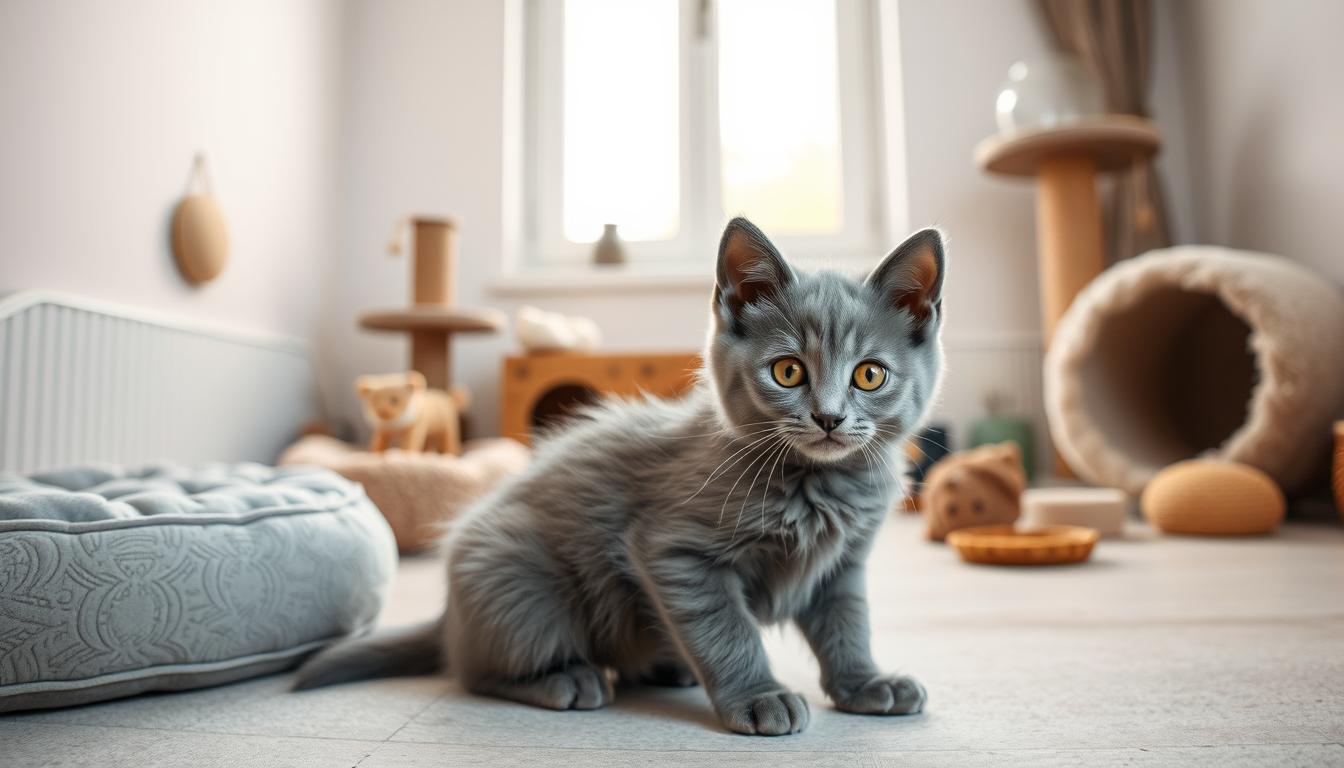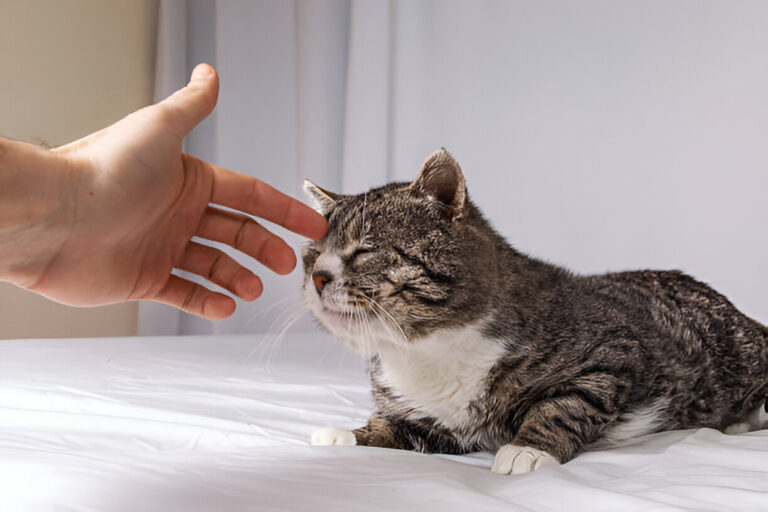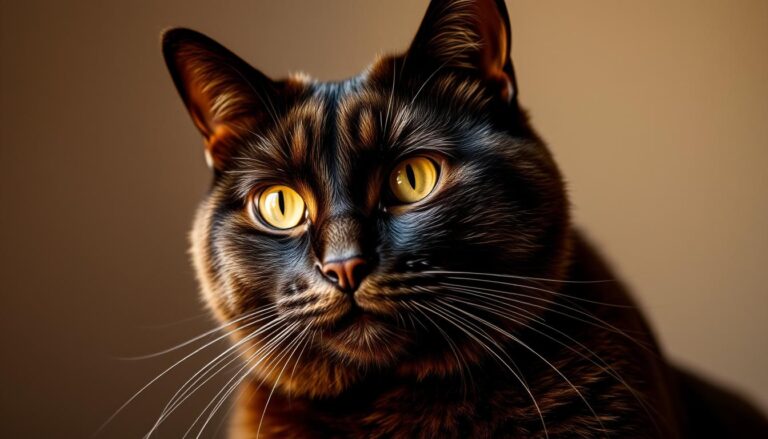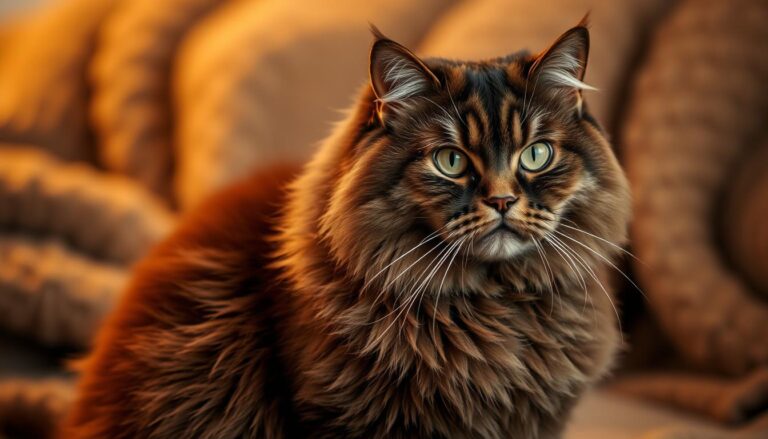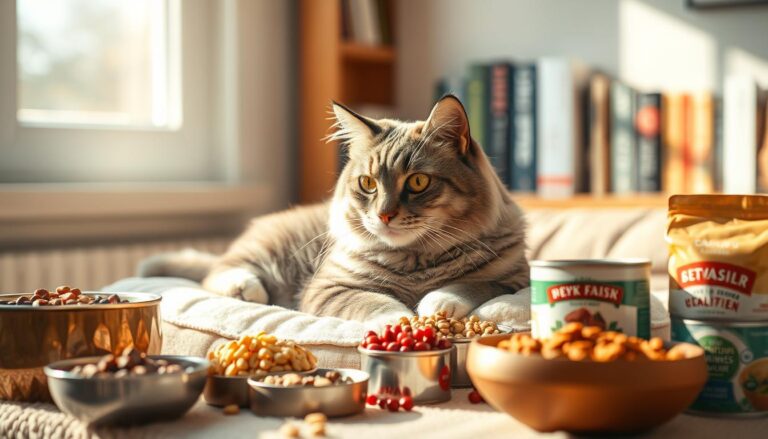Caring for a British Blue Kitten: Tips and Advice
When I brought home my British Blue kitten, I was amazed by its stunning blue-gray fur and copper eyes. Welcoming a blue British shorthair kitten is more than just cute. It’s a journey of love and companionship that changes your world.
The British Blue kitten is a special breed. They are elegant, intelligent, and gentle. These cats have won the hearts of many in the United States with their unique looks and calm nature. Knowing their needs is key to caring for them well.
This guide is for both new and experienced cat owners. It covers everything about caring for a blue British shorthair kitten. We’ll talk about nutrition, healthcare, and creating a great home for them. You’ll learn how to raise a happy, healthy kitten.
Table of Contents
Understanding the British Blue Kitten Breed Characteristics
Exploring the world of british blue shorthair cats is a joy. These cats are known for their beautiful looks and kind nature. They win hearts with their unique appearance and gentle spirit.
The british blue shorthair is a wonderful pet for those who love cats. They are calm, loving, and have many special traits. This makes them a favorite among cat lovers.
Distinctive Physical Traits
British blue cats have some amazing physical features:
- They have a thick, blue-gray coat with a shiny look.
- Their face is round and chubby, with full cheeks.
- They have big, bright copper or gold eyes.
- They have a sturdy, medium-sized body.
- Their fur is short and soft, feeling great to touch.
Personality and Temperament
“A british blue shorthair is like a gentle cloud with a personality that melts your heart.” – Feline Breed Experts
Your blue british cat will bring peace and friendship to your home. They are known for being:
- Very calm and relaxed.
- Gentle and friendly.
- A bit playful, but not too much.
- Very attached to their family.
Health Considerations
Even though they are mostly healthy, blue british cats might have some health issues:
- Hypertrophic cardiomyopathy – a heart problem.
- They might have kidney issues because of their genes.
- They can get fat if they eat too much.
Knowing these traits will help you take good care of your british blue shorthair.
Essential Supplies for Your New British Blue Kitten
Getting a British Blue kitten means you need to get the right stuff ready. Your new pet will need certain things to feel at home and happy.
First, make a list of what your British Blue cat needs. The right stuff can really help your kitten stay healthy and happy.
Must-Have Supplies Checklist
- Litter Box and High-Quality Litter
- Feeding Bowls (Ceramic or Stainless Steel)
- Soft Bed or Cat Carrier
- Scratching Post
- Interactive Toys
- Grooming Tools
The cost of a British Blue cat can change, but spending on good supplies is worth it. You’ll likely spend $100-$300 to get started.
| Supply Category | Estimated Cost | Recommended Brands |
|---|---|---|
| Litter Box Setup | $40-$80 | PetSafe, World’s Best Cat Litter |
| Feeding Essentials | $30-$60 | Royal Canin, Purina |
| Toys and Enrichment | $50-$100 | Kong, Petstages |
Pro tip: Invest in durable, washable items that can grow with your British Blue kitten.
“Preparation is key when welcoming a new kitten into your home.” – Veterinary Experts
Remember, quality is more important than how many things you get. Pick items made for kittens that are comfy, safe, and last long.
Creating the Perfect Home Environment
Getting ready for your British Blue kitten means planning carefully. Top breeders suggest a space that fits their needs, is comfy, and safe.
Your kitten needs a special living area. It should support their health and happiness. Breeders say it’s key to make a place that’s fun yet safe.
Safe Spaces and Hiding Spots
British Blue kittens enjoy private spots. Here are some important things to consider:
- Provide multiple cozy hiding spots
- Use soft cat beds with high sides
- Create elevated perches near windows
- Ensure quiet spaces away from household traffic
Temperature Control and Comfort
These cats need stable, warm temperatures. Keep rooms between 68-72°F for their comfort.
| Temperature Range | Kitten Comfort Level |
|---|---|
| Below 65°F | Too Cold |
| 68-72°F | Ideal |
| Above 75°F | Potentially Uncomfortable |
Setting Up Litter Areas
Choose quiet spots for litter boxes. British Blue kittens like clean, private areas for their bathroom needs.
- Place litter boxes in low-traffic areas
- Use large, uncovered litter boxes
- Maintain daily cleaning routines
- Provide multiple litter box options
Pro tip: Consult reputable british blue kitten breeders for personalized advice on creating the perfect home environment for your new companion.
Nutrition Guidelines for British Blue Kittens
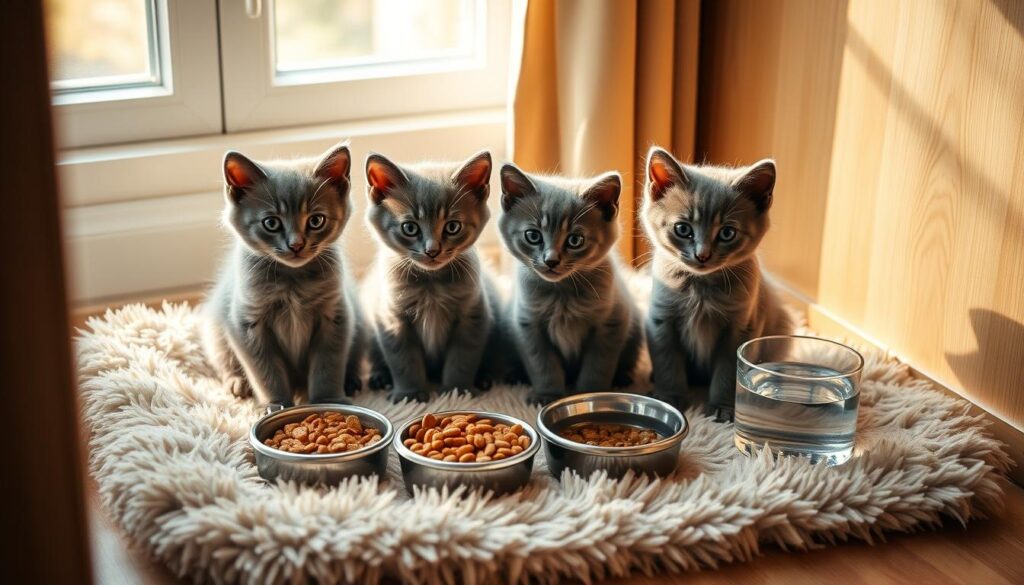
Proper nutrition is key for caring for british blue kittens. These cute cats need a diet that supports their growth. Choosing the right food is vital for their health and energy.
When picking food for your british blue kittens, remember these important points:
- High-protein kitten-specific formulas
- Age-appropriate meal portions
- Essential nutrients for bone and muscle development
- Balanced minerals for coat health
Good breeders know how important early nutrition is. Kittens need special diets that are different from adult cats. Wet food should be a big part of their diet, giving them important hydration and protein.
Here are some key nutrition tips:
- Feed kitten-specific food for the first 12 months
- Provide small, frequent meals
- Ensure fresh water is always available
- Monitor weight and adjust portions accordingly
Your british blue kitten’s diet affects their growth, immune system, and health. Talk to your vet to make a nutrition plan that fits your kitten’s needs.
Establishing a Feeding Schedule and Routine
Feeding your blue British shorthair kitten needs careful planning. A good nutrition plan helps them grow healthy and keeps their unique look. It’s important to know their nutritional needs and balance their meals.
Wet Food vs Dry Food Balance
Experts say a mix of wet and dry food is best for blue British shorthair kittens. The right mix is:
- 70% wet food for moisture and protein
- 30% high-quality dry kibble for dental health
- Age-appropriate nutritional formulas
Portion Control and Weight Management
British blue kittens can easily gain weight. So, it’s key to control their portions. Here’s a guide to keep them at a healthy weight:
| Age | Daily Portion | Feeding Frequency |
|---|---|---|
| 2-4 months | 1/4 to 1/2 cup | 4 times daily |
| 4-6 months | 1/2 to 3/4 cup | 3 times daily |
| 6-12 months | 3/4 to 1 cup | 2 times daily |
Hydration Requirements
Keeping your kitten hydrated is crucial. Encourage water intake with these tips:
- Provide fresh water daily
- Use wide, shallow water bowls
- Consider water fountains to increase drinking
- Mix wet food to boost moisture consumption
Watching your kitten’s diet closely is key to their health and growth.
Grooming and Hygiene Requirements
Keeping your blue British cat’s coat looking great needs special grooming. They have a short, luxurious coat that needs regular care to stay healthy and shiny.
Brushing is key for their coat. Brush your kitten 2-3 times a week. Use these tools:
- Soft-bristled cat brush
- Grooming glove
- Slicker brush for removing loose hair
Don’t forget about nail care. Trim your cat’s nails every 2-3 weeks to stop them from getting too long. Use cat-specific nail clippers and be gentle.
Dental care is also important. Here’s how to keep their teeth clean:
- Brush teeth weekly with cat-specific toothpaste
- Provide dental treats
- Schedule professional dental cleanings
Bathing is not often needed for these cats. They are good at grooming themselves. Just brush them regularly to keep their coat shiny and healthy.
Healthcare and Veterinary Needs
Understanding your British Blue kitten’s healthcare needs is key to their long-term health and happiness. Good veterinary care protects your investment and keeps your kitten healthy for life.
Being a responsible pet owner means more than just the initial cost. Your kitten needs ongoing medical care to thrive.
Vaccination Schedule
A strong vaccination program is vital to protect your British Blue kitten from diseases. Your vet will suggest a vaccination plan that includes:
- Core vaccines at 6-8 weeks
- Booster shots every 3-4 weeks
- Rabies vaccination around 12-16 weeks
- Annual wellness exams
Parasite Prevention
Keeping your British Blue kitten safe from parasites is crucial. Regular treatments protect them from:
- Fleas and ticks
- Intestinal worms
- Heartworm prevention
Regular Health Checks
Regular vet visits are essential for your British Blue kitten. These visits help:
- Spot health issues early
- Check growth and development
- Keep vaccinations up to date
- Do thorough physical exams
Proactive healthcare can greatly lower long-term medical costs. It ensures your British Blue kitten stays healthy and happy.
Exercise and Play Requirements
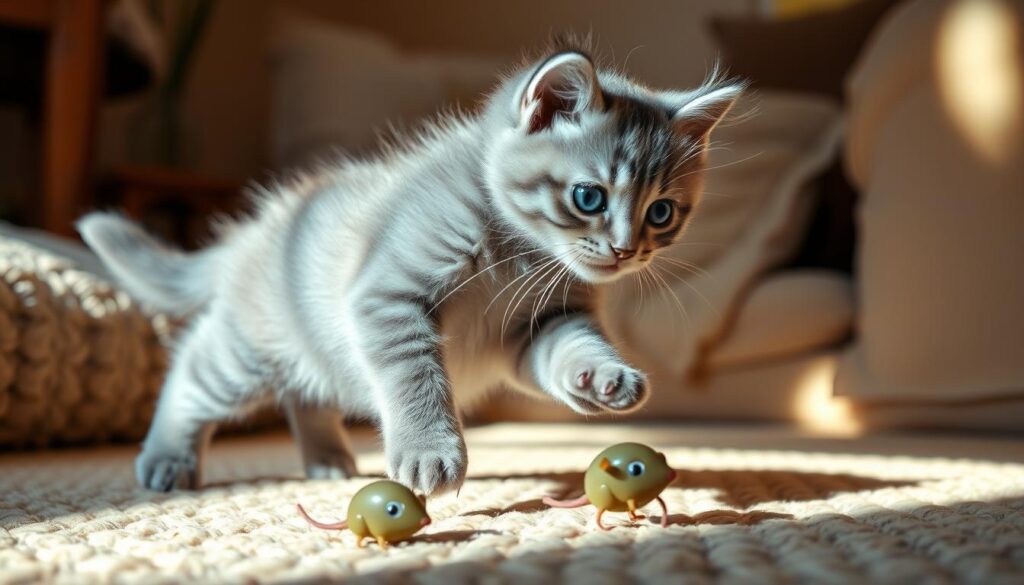
British Blue kittens may seem calm, but they need regular exercise and mental play. When looking for kittens for sale, think about their play and activity needs. This ensures they are happy and healthy.
Playtime is key for these cute cats. Good breeders know how important play is for a kitten’s health. Your British Blue kitten will love activities that fit their personality.
- Interactive Toys: Wand toys, laser pointers, and puzzle feeders keep your kitten mentally and physically active
- Climbing Structures: Cat trees and scratching posts provide excellent exercise opportunities
- Solo Play Items: Small balls, crinkle toys, and soft mice encourage independent play
Try to have short play sessions all day. Young British Blue kittens like 10-15 minute play periods. This helps them stay healthy and grow well.
Change toys often to keep your kitten interested. British Blue kittens are smart and can get bored easily. New toys keep them excited and help them use their hunting skills.
Playtime is not just fun – it’s an essential part of your kitten’s physical and emotional growth!
Conclusion
Getting a British Blue kitten is an exciting journey that needs careful planning and commitment. Choosing the best breeders is key to a healthy and loving bond with your new pet. Understanding their special needs will make sure your pet is happy and thriving.
Good care for a British Blue kitten means paying attention to their diet, health, and emotional well-being. Proper feeding and a cozy home are crucial for their happiness. Breeders can help at first, but your love and care will shape your kitten’s life.
Being a responsible owner means learning about your kitten’s breed, health, and personality. With patience, knowledge, and love, you’ll create a strong bond. This bond will bring joy and companionship for many years.
Every British Blue kitten is different, and your care will make a big difference. With the right research, vet support, and a loving home, your kitten will become a cherished family member.
FAQ
How much does a British Blue kitten typically cost?
How much does a British Blue kitten typically cost?
FAQ
How much does a British Blue kitten typically cost?
A British Blue kitten can cost between
FAQ
How much does a British Blue kitten typically cost?
A British Blue kitten can cost between $1,000 and $2,500. This price depends on the breeder’s reputation and the kitten’s quality. The kitten’s lineage, coat quality, and health also play a big role in the cost.
Are British Blue kittens good for families with children?
Yes, British Blue kittens are great for families. They are calm and gentle, making them perfect for kids. They are patient and laid-back, fitting well into family life. But, always watch when kids and kittens play together.
How often should I groom my British Blue kitten?
Brush your British Blue kitten 2-3 times a week. This keeps their coat soft and prevents matting. Regular grooming also helps distribute skin oils.
What are the common health issues in British Blue kittens?
British Blue kittens might face health problems like hypertrophic cardiomyopathy and polycystic kidney disease. They can also have eye issues. Regular vet visits and choosing a reputable breeder can help prevent these problems.
What type of diet is best for a British Blue kitten?
Feed your kitten high-quality, protein-rich food. Choose wet and dry foods made for kittens. They need a good mix of protein, fats, and nutrients. Talk to your vet to find the best diet for your kitten.
How much exercise do British Blue kittens need?
British Blue kittens need daily play and mental stimulation. Play with them for 10-15 minutes, 2-3 times a day. Use toys like feather wands or laser pointers to keep them active.
Where can I find reputable British Blue kitten breeders?
Find breeders through cat associations, vet recommendations, or cat shows. Research them well. Check their credentials, visit their facilities, and ask for health records.
How long do British Blue cats typically live?
British Blue cats can live 12 to 20 years with proper care. Good genetics, diet, and indoor living help them live longer.
Are British Blue kittens hypoallergenic?
No, British Blue kittens are not hypoallergenic. They shed moderately and have normal allergens. If you’re allergic, spend time with them before getting a kitten.
What is the ideal living environment for a British Blue kitten?
British Blue kittens need a calm, stable home. They need comfy spots to rest and play. Keep the temperature between 68-75°F. They prefer quiet, predictable homes.
,000 and ,500. This price depends on the breeder’s reputation and the kitten’s quality. The kitten’s lineage, coat quality, and health also play a big role in the cost.
Are British Blue kittens good for families with children?
Yes, British Blue kittens are great for families. They are calm and gentle, making them perfect for kids. They are patient and laid-back, fitting well into family life. But, always watch when kids and kittens play together.
How often should I groom my British Blue kitten?
Brush your British Blue kitten 2-3 times a week. This keeps their coat soft and prevents matting. Regular grooming also helps distribute skin oils.
What are the common health issues in British Blue kittens?
British Blue kittens might face health problems like hypertrophic cardiomyopathy and polycystic kidney disease. They can also have eye issues. Regular vet visits and choosing a reputable breeder can help prevent these problems.
What type of diet is best for a British Blue kitten?
Feed your kitten high-quality, protein-rich food. Choose wet and dry foods made for kittens. They need a good mix of protein, fats, and nutrients. Talk to your vet to find the best diet for your kitten.
How much exercise do British Blue kittens need?
British Blue kittens need daily play and mental stimulation. Play with them for 10-15 minutes, 2-3 times a day. Use toys like feather wands or laser pointers to keep them active.
Where can I find reputable British Blue kitten breeders?
Find breeders through cat associations, vet recommendations, or cat shows. Research them well. Check their credentials, visit their facilities, and ask for health records.
How long do British Blue cats typically live?
British Blue cats can live 12 to 20 years with proper care. Good genetics, diet, and indoor living help them live longer.
Are British Blue kittens hypoallergenic?
No, British Blue kittens are not hypoallergenic. They shed moderately and have normal allergens. If you’re allergic, spend time with them before getting a kitten.
What is the ideal living environment for a British Blue kitten?
British Blue kittens need a calm, stable home. They need comfy spots to rest and play. Keep the temperature between 68-75°F. They prefer quiet, predictable homes.

